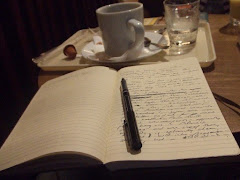
Interviewer: Ryan McCarl
Featured self-educator: Margaret Viola
Self-educator’s age: 21
Self-educator’s hometown: Oshkosh, WI
Date: 8 August 2009
(Editor’s note: This is the second in a series of interviews Wide Awake Minds will be conducting with educators and self-educators. If you enjoy these interviews or other material on this blog, please consider linking to us, mentioning us on Facebook and Twitter, and emailing and sharing our articles. If you would like to share your story as an educator or self-educator, please contact me and I’ll send you a questionnaire. Thanks for reading!)
What is your profession or area of study?
College student – concentrating in Physics, minoring in East Asian Studies (emphasis in Mandarin Chinese).
Does the description of the self-educator’s mind as a “wide-awake mind” resonate with you?
Yes – the term is clever and quite apt. It captures the essence of “active awareness,” of “conscious evolution” that pervades the individual who is master of his/her own mind.
Who are your educational, intellectual, artistic, and moral role models?
The artist Marc Chagall – who “painted with his emotions,” so to speak; I admire his ability to honor and listen to his intuition. I also consider the late Peter Jennings, the famous ABC News anchor, an intellectual and moral role model – he was an individual who embodied dignity with humility, whose intellectualism was exuded through kind and compassionate dialogue with and for the world. I hold Condoleeza Rice in the highest regard for her discipline and elegance, two traits which, I believe, are just as valuable as pure intellect. And lastly, Margaret J. Wheatley is a phenomenal force for change and global compassion and awareness. I cannot read enough of her writing!
How have you felt about your formal education? What changes do you think should be made to America’s system of formal education, or to the way we think about education?
I have often been frustrated by the arbitrary rules that formal institutions set as their metrics of educational success. I find the present grading system, the tenure system, windowless lecture halls, and (often badly written) exams to be stifling wastes of time. However, in present-day society, the college degree is a necessary credential, and one that I am only nine months away from earning.
An absolutely critical change that must be made to the American educational system is the adaptation of curricula to the “visual-spatial” learner. Current methods only educate those with the old “audio-sequential” learning style, which leaves some of the most brilliant minds in the dark.
20% of the population is able to think multi-dimensionally, that is, think in terms of moving images rather than verbal-auditory symbols. That 20% consequently thinks at a rate many times faster than their audio-sequential counterparts. These brilliant people are labeled “dyslexic.” Can you tell that I am one of these so-called "dyslexic” individuals?
What do you see as the importance of reading?
The importance of reading is that it is a bridge from one mind to another. Individuals who dislike reading (as does my dyslexic brother) can reap the same benefits from audio-books and educational tools such as a pen that will “say” a word out loud as my brother looks at it.
My curiosity leads me to the texts I read; currently I am reading about “energy medicine,” Eastern philosophies, and “conscious evolution" to global awareness. Dacher Keltner is one of my favorite modern writers and scholars – I would like to see his thoughts on the “wide awake mind!”
Do you find that conversations and other exchanges with other people can be educative, and if so, do you seek out such exchanges?
I think the challenge of intellectual conversation is essential! I long for the experience of the “French Salons” of the Enlightenment era, and I try to re-create such events in my apartment in Chicago in my spare time.
Do you feel that it is important to follow current events and/or participate in political debate, and if so, why?
I believe in the oneness of all things – of the global “web” of life, in which an action, a thought, has a ripple effect on the whole. And therefore I feel it is so, so very important to listen to the global dialogue with compassion, and contribute one's own voice. I believe that by openly “hearing” the viewpoints of others, we create an environment in which our own viewpoints are welcome – fostering the reciprocity essential for global prosperity.
What books would you recommend to other self-educators, that is, to other people who want to make a conscious effort to learn more, discover more, and expand their minds?
I wish that everyone in the world could read Margaret J. Wheatley's book Turning to One Another: Simple Conversations to Restore Hope in the Future. I also strongly recommend Eckhart Tolle's The New Earth. If everyone on Earth read just these two books – the change that could arise from the compassionate awareness the texts foster would be limitless! And for those with a more practical eye on the future, I strongly recommend A Whole New Mind by Daniel Pink.
Thanks, Margaret, for reading and sharing your insights!




